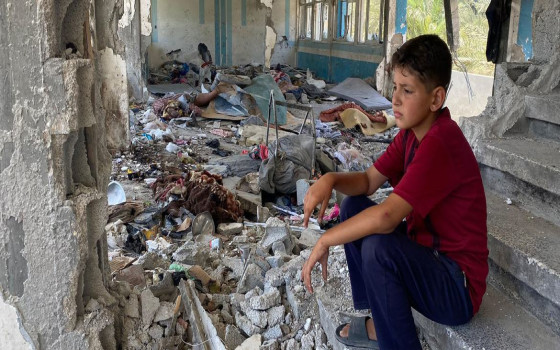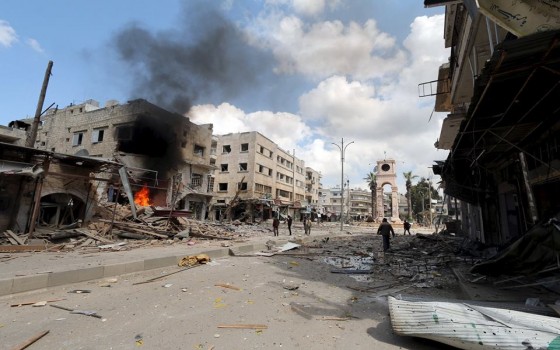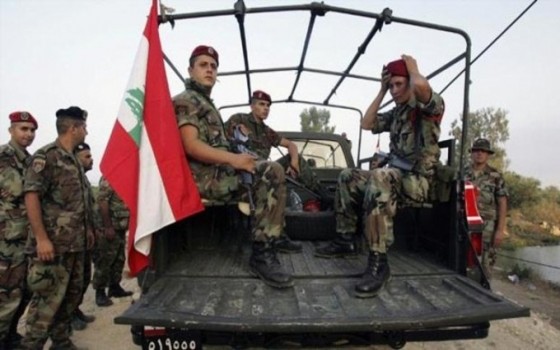
The nightmare continues... UN: The catastrophic situation in Gaza is the worst since the beginning of the war

- Europe and Arabs
- Saturday , 31 May 2025 9:31 AM GMT
Gaza - Geneva: Europe and the Arabs
The United Nations Office for the Coordination of Humanitarian Affairs (OCHA) stated that the humanitarian operation in Gaza is one of the most challenged, "not only in the world today, but in the recent history of the global humanitarian response anywhere." According to the UN daily news bulletin, which added, "In response to questions from journalists in Geneva, OCHA spokesperson Jens Laerke said that "Israel, the occupying power, imposes a closure and tight control" on the humanitarian operation, and stressed that the amount of aid allowed into the Strip "does not go beyond a drip feed to an area on the brink of catastrophic famine."
In addition, he said that the movement of aid into and through the Strip is extremely complex and obstructed, requiring multiple sets of Israeli approvals, and stressed that "permits are granted and then withdrawn again without explanation."
Laerke said that the alternative proposed by Israel, represented by the so-called "Gaza Humanitarian Foundation," is "neither neutral, nor independent, nor practical." He stated that need should be the sole criterion for receiving aid, "not based on people's ability to walk 20 kilometers." He added, "What they are doing is desperate, tragic, depressing, and absolutely inhumane."
He said that the intent of the Israeli method of distributing aid "appears to be to undermine the food distribution that it is carrying out." The United Nations, which is exactly what is needed in a situation of acute food insecurity on the brink of catastrophic famine. People must be fed immediately, and this must be done every day. Feeding a family today and letting them starve again tomorrow does not help.
The OCHA spokesperson said the UN has a functioning system, with tens of thousands of pallets of food and other life-saving aid ready to enter Gaza, paid for by donors around the world. But he stressed that "the occupying power is deliberately preventing aid from entering."
He said that concerns about aid being diverted—to other parties—"without new evidence" do not justify halting the humanitarian operation. He emphasized that the UN and its partners apply strict oversight to every shipment they handle, "and we have not witnessed any significant diversion of aid under our control."
He added: "What happens outside the system we control is not our responsibility. Our responsibility lies in the aid we bring, which is strictly controlled."
Laerke said that many of the aid trucks allowed into Gaza were seized by crowds of people, describing it as a "survivalist reaction by desperate people who want to feed their families and children."
He said he did not blame them "for a moment for taking aid that was essentially theirs, but was not distributed in the way we wanted."
He stressed the need to reopen all crossings into the Strip, and for the UN to be able to deliver food directly to families wherever they are. He added, "Our ultimate responsibility is to the people we serve, no one else, and they need aid to reach where they are, as we have done in the past."
Laerke reiterated that Gaza is "the hungriest place on earth" because it is the only specific area where "100% of the population is at risk of famine."
"An ongoing nightmare"
For his part, a spokesman for the International Federation of Red Cross and Red Crescent Societies said Red Cross chief Tommaso Della Longa said the situation is particularly worrying and frustrating given the tons of humanitarian aid ready to enter the Strip, adding that the situation is worsening "minute by minute, not week by week." He told reporters in Geneva: "It's hell on earth. It's a continuous nightmare. I have no other words to describe it. What I do know is that the suffering is immense. It's ongoing, minute by minute, and it's happening live around the clock. Everyone in the world knows this, but we still lack action." This is frustrating, disturbing, and unacceptable.”
For his part, UN spokesman Stéphane Dujarric said the catastrophic situation in Gaza is “the worst since the beginning of the war,” with shelling continuing throughout the Strip, particularly in the north, where the last partially functioning hospital was forced to evacuate yesterday.
According to the Office for the Coordination of Humanitarian Affairs, displacement has continued throughout the Gaza Strip, with nearly 200,000 people displaced in the past two weeks alone.
Dujarric added that the UN and its partners were able to collect only five truckloads from the Palestinian side of the Kerem Shalom crossing, while another 60 trucks were forced to return to the crossing due to intense hostilities in the area.
In response to reporters’ questions, the spokesman said that the Israeli army had authorized the use of the road, “but the area around Kerem Shalom is an area where many armed gangs are active, particularly in the no-man’s land a few kilometers from the crossing.” He said the five trucks were carrying medical supplies for the field hospital in Deir al-Balah, but were tragically looted in an organized operation by armed men. He said the men stormed the field hospital's warehouse and looted the supplies, including "medicines and nutritional supplements intended for malnourished children."
Dujarric said the humanitarian community stresses the need to lift restrictions on Gaza and take action to ensure the root causes of the "widespread deprivation" in the Strip are addressed.
Regarding the situation in the West Bank, OCHA reported that Israeli settler violence continues to increase, with more than 220 Palestinians injured this year as a result, the highest rate in the past 20 years.
Dujarric said that Israeli movement restrictions across the Salfit Governorate in the northern West Bank continue to impede access to "nearly 90,000 people in need of healthcare, education, and access to livelihoods."












No Comments Found